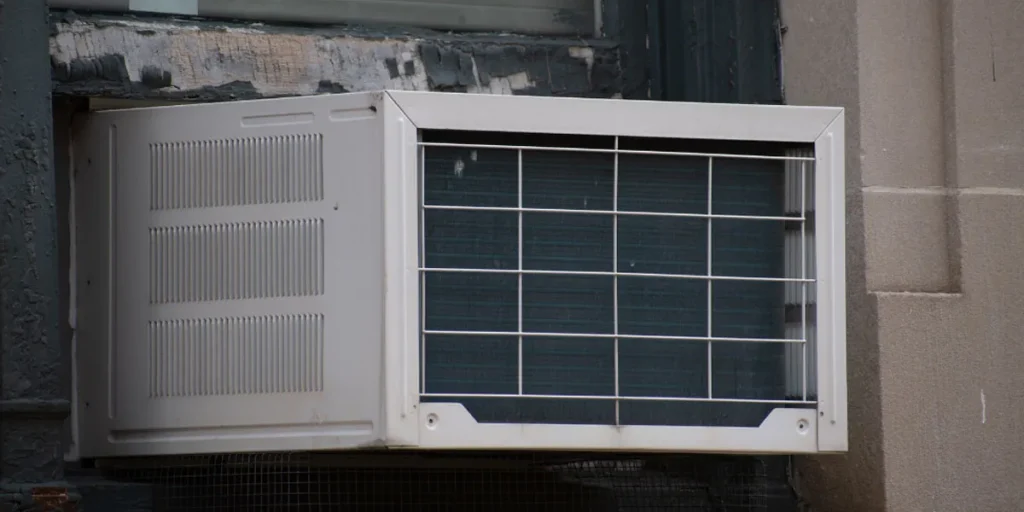A typical window AC unit weighs between 40 and 80 pounds. The exact weight depends on the model and capacity of the air conditioner.
Shopping for a window air conditioner requires a consideration of various factors, including its weight, as it affects installation and support structures.
Window ACs come in varying sizes to cater to different room dimensions and cooling needs.
The weight is an important detail often overlooked, yet it is critical for secure mounting and to ensure that the window frame can support the unit.
For those installing a unit without professional help, knowing the weight can assist in preparation and safety.
Manufacturers provide this information in the product specifications, which should be consulted before making a purchase.
Always prioritize compatibility with your window size and the structural integrity of the installation area when selecting a window air conditioning unit.
Weight Matters In Window AC Units
Imagine trying to lift your window AC unit and struggling because it’s surprisingly heavy. Weight is a crucial factor to consider.
It affects installation, energy efficiency, and even the structure of your window frame. So, let’s explore how much window AC units typically weigh and what contributes to their heftiness.
Variations By Size And Model
Not all window AC units tip the scales the same way. The size and model of the unit make a big difference:
- Small units for rooms up to 300 sq. ft. weigh around 40-60 pounds.
- Medium units designed for spaces between 300-700 sq. ft. can weigh between 50-80 pounds.
- Large models, cooling areas over 700 sq. ft., might weigh 70-100 pounds or more.
These numbers can vary based on features and brand specifications. Always check the weight before purchase, especially if you’re installing it on your own.
Contributing Components
Several parts of a window AC unit add to its weight:
| Component | Description | Impact on Weight |
|---|---|---|
| Compressor | The part that pumps refrigerant and cools the air. | Heavy, significant contributor. |
| Heat Exchanger | Coils that remove heat and moisture from the air. | Quite bulky, adds noticeable weight. |
| Fan Motor | Drives fans that blow cooled air into the room. | Moderate weight, depending on size. |
| Chassis | The frame that houses all components. | Varies, but generally heavy due to metal construction. |
The combination of these components ensures your room stays cool. But they also add up in weight, making some units quite hefty!
Size Vs. Weight

Imagine lifting your window AC unit; its weight feels like a big hug from a metal box, right? The weight of a window AC unit can influence your choice.
It affects installation ease and the strength of the window it will sit on. Heavier units need sturdier windows and more hands on deck for installation.
Smaller units might be a one-person job. Let’s explore how the size of an AC often decides its weight.
Compact Units: Light And Manageable
Compact window AC units prove that great things come in small packages. These little cool-makers are perfect for cozy spaces.
We’re talking about those units that usually weigh as light as 40 pounds. This means:
- Easy to move around by one person.
- Ideal for small rooms or apartments.
- Quick and simple installation.
Midsize Models: The Middle Ground
Midsize models stand in the sweet spot, tackling larger rooms without the heavyweight tag. They tend to tip the scales between 50 to 70 pounds. Here’s what to expect:
- A good mix of efficiency and manageable weight.
- Suitable for medium-sized areas.
- Installation might need an extra pair of hands.
Large Units: Tipping The Scales
With large window AC units, bulk brings the chill to big spaces. These can weigh over 100 pounds. Consider the following:
- Heavy-duty cooling power.
- Best for large living spaces and offices.
- Installation may require professional help and support brackets.
Materials And Construction Impact

Materials and construction play a vital role in the weight of a window AC unit. The choice of material not only affects the durability but also the heaviness of the air conditioner.
Understanding these factors can help you better prepare for installation or transportation needs.
Metal Vs. Plastic Frames
Metal frames provide robustness to window AC units. AC units with metal frames typically weigh more due to the density of materials like steel or aluminum.
On the other hand, plastic frames often lead to a lighter window AC unit. Plastic, being less dense than metal, trims down the weight significantly.
The comparison between the two can be showcased as follows:
| Material Type | Typical Weight | Durability |
|---|---|---|
| Metal Frames | Heavier | More Durable |
| Plastic Frames | Lighter | Less Durable |
Influence Of Advanced Features
Advanced features in window AC units often impact the weight. Features such as digital displays, remote controls, and programmable timers add complexity and bulk.
High-efficiency compressors and advanced cooling technologies can also increase the weight. Here’s a quick rundown of how features influence weight:
- Digital displays and controls: Slightly adds to the weight
- Programmable timers: Can add additional weight
- High-efficiency components: Increase weight but offer energy savings
Installation Implications Of Ac Weight
Understanding the weight of a window AC unit is vital before installation. It affects where and how you can safely install the unit.
Heavier ACs may need more support. Lighter models are easier to handle.
Safety Considerations
Handling a window AC unit requires caution due to its weight. Improper lifting can cause injury. Always use proper lifting techniques.
Get help if the unit is too heavy for one person. Ensure the installation area is clear of obstacles.
Structural Support Requirements
Structural integrity is key for window AC installation. Weak structures could lead to accidents.
Check the window frame strength. Add extra support if needed. This ensures a stable and secure AC fitting.
- Review the window AC unit’s manual for weight and support guidelines.
- Assess the window sill and frame for sturdiness.
- Use brackets or supports if the AC unit exceeds window strength.
Weighty Decisions: Choosing The Right Ac
When summer heat hits, a window AC unit can be your best friend. But before you buy one, you need to think about its weight.
Let’s dive into two big factors to help you find the perfect cool companion for your space.
Efficiency And Power Balance
The weight of a window AC unit often hints at its power. More powerful units can weigh more. But power isn’t the only thing to consider.
You also want an AC that’s energy efficient. Energy efficiency means your AC cools your room without a huge electricity bill.
Look for units with a high Energy Efficiency Ratio (EER) or Seasonal Energy Efficiency Ratio (SEER).
These ratings show you how well the unit uses power. A high rating means a more efficient AC—and long-term savings.
Portability And Seasonal Storage
Do you need to move your AC often? Or do you plan to pack it away when winter comes? If so, the weight of your AC matters a lot.
Lightweight units are easier to move and store. But, they might not be as powerful or efficient as heavier ones. To help you decide, consider these points:
- Lighter units: Usually weigh between 40-60 pounds. These are good for small rooms.
- Heavier units: Can weigh over 100 pounds. They’re meant for larger spaces.
- Handles and wheels: Some models have these to make moving easier.
Pick a weight that’s a good balance for your cooling needs and your ability to move and store the unit.
FAQ About the Weight of a Window AC Unit
What Is The Average Weight Of A Window Ac?
Window AC units typically weigh between 40 and 80 pounds. Compact models are on the lighter end, while larger units can be heavier.
Can I Install A Window Ac Unit Alone?
Installing a window AC by yourself is feasible if it’s lightweight (under 50 pounds) and you’re comfortable handling the unit.
For safety and ease, however, heavier models or challenging window setups may require assistance.
How Does Btu Affect Window Ac Weight?
Generally, the higher the BTU (British Thermal Unit) rating, the heavier the window AC.
This is because larger compressors and components are needed to cool more space.
Do Window Ac Dimensions Correlate With Weight?
Yes, larger window AC units are typically heavier due to increased materials and components.
Smaller units are more compact and lighter, making them easier to install and handle.
Conclusion
Understanding the weight of your window AC unit is vital for safe installation and compatibility with your space.
Compact models may start around 40 pounds, scaling up to 100 pounds or more for larger units.
Always consult the manufacturer’s specifications to ensure optimal placement and support.
With the right knowledge, you can keep your cool efficiently all summer long.
Resources:
https://www.energystar.gov/products/ask-the-experts/how-choose-right-sized-window-ac
https://www.energy.gov/energysaver/room-air-conditioners
